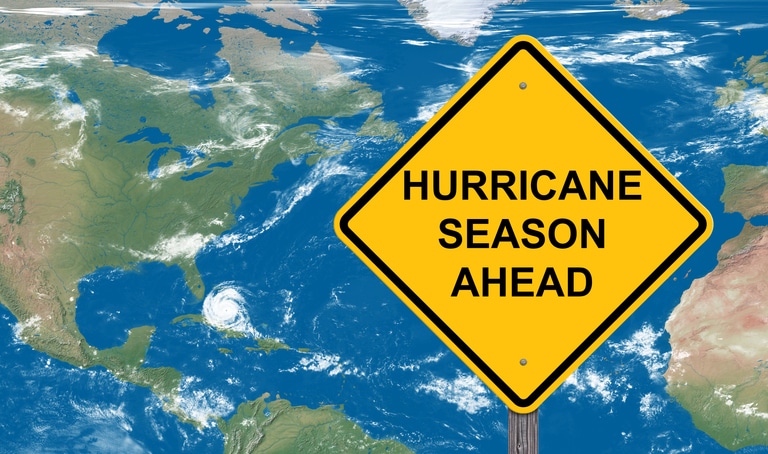
Hurricane Season Is Here: Is Your Business Continuity Strategy Up-To-Date?
The hurricane season is here and it is time to re-evaluate your business continuity planning. The hurricane season has been causing havoc by putting the disaster recovery and continuity plans of businesses to test. It only takes one storm to significantly disrupt your business operations and put you out of business. The disaster can put your business at risk of data loss, facility damage, and downtime among other inconveniences.
BoomTech has two downloads to help you prepare for the 2020 Hurricane Season
Emergency planning and preparation is critical in dealing with the disaster for a small and mid-sized organization. With careful planning, the degree of impact from a corporate perspective can be mitigated. Business continuity planning is a critical component of dealing with the effects of a disaster. As another hurricane season ramps up, it is perhaps a good reminder for organizations to review their business continuity plans. Here is what you should know about business continuity planning and disaster recovery during the hurricane season.

Importance Of Creating A Business Continuity Plan
The importance of creating a business continuity plan incorporating the latest recovery strategies is critical during this season. A large percentage of small businesses do not reopen after a disaster due to a lack of continuity planning. As a result, they are largely affected by any disaster and will take a long time to recover. If your business cannot survive three months of daytime, then it is a good time to evaluate your business continuity strategy.
A business continuity plan is needed in the face of disasters. Continuity plans are different from recovery plans based on their effect on a business. While both are preventive strategies outlining backup plans during a disaster, business continuity takes a larger picture of ensuring smooth operations throughout the year. This means a business will continue to function before, during, and after a potentially catastrophic storm. Therefore, the disaster recovery plan is a component of business continuity.
Business continuity planning is done on a more strategic level to cover risk management, human safety, and intellectual property procedures. This continuity plan concerns the processes that can maintain business operations in case of a disaster. It will provide a guide on how employees will operate when the facility is inaccessible and how they will access the critical information. There are several steps you can take to ensure your business continuity plan includes disaster recovery.
How To Create A Business Continuity Plan
Understand and assess your risk
The first thing is to gauge your level of risk by performing a threat analysis. Understanding how a hurricane will affect your business is a great starting point for continuity planning. This entails assessing the process of keeping your business running, the available resources, and how long the disaster recovery will take. A detailed risk assessment can help identify the extent of damage your business could suffer during a hurricane.
Understanding the risks entail assessing how you can safely and securely store files and other materials in case of an emergency. Regular assessment of your organization can ensure you are prepared and ready to mitigate any effects of the hurricane. You also need to create a procedure for what to do in case a disaster happens and communicated to all employees.
Protect your data
An effective continuity plan in this modern age is to protect your most important information in case of a disaster. Your plan should involve a list of all business functions ranked based on their priorities to the business. One of the most important things to facilitate continuity is to back up your data. Data loss is common with disasters, and data backup will help in disaster recovery. Data backups will protect your critical business information by storing them in cloud storage or external sources. The type of catastrophic data loss during a disaster is one of the detrimental effects for organizations.
A majority of people don’t have continuity and disaster recovery plans, which puts them at an extended risk in case of a disaster such as a hurricane. Cloud backups can make your business more resilient during this hurricane season. In case there is a hardware or software failure, the backups ensure that you do not lose all your important information. Backing up your data through an off-site storage vendor is one way of protecting your critical information. Also, you can maintain redundant servers in multiple locations as a strategy for protecting your critical data.
Equip your employees
Your employees are the most important asset of the business and can be integral in business continuity planning. People-planning often lags behind IT planning when it comes to disaster recovery and that is one of the huge mistakes in business continuity. Therefore, your organization should plan the logistics of getting employees to work after a disaster as a key to remaining in business.
You need to evaluate how your employees will continue to work during and after a hurricane disaster. Such plans can involve remote working that requires access to information and applications needed to function. Your employees need to know where copies of business-critical data are stored and how to access the information if a disaster occurs.
Test your plan
It is essential to have a business continuity plan in place, but you will need to test it and ensure all employees are on board. The testing is required to ensure everyone understands their roles once a disaster occurs and will perform them appropriately. A regular review of the plan with managers and other members of staff will help in identifying where you can make some improvements. You should revise the continuity plan whenever there are changes in technology infrastructure or operations.
Trust the experts
Part of business continuity plans is to trust the services of professionals in some areas and use their expertise to an advantage. Your business should consult with professionals to get business and technology knowledge of managing disasters. Professionals should be consulted to perform several roles such as threat analysis and charting probabilities of a disaster.
BoomTech Will Help With All Your Business Continuity Planning
The beginning of the hurricane season is a good reminder to revisit your business continuity plans. These plans offer an organization the additional level of preparedness by addressed the structure, processes, and people I a business. The business continuity plan should be an up-to-date plan to ensure efficiency and operational organization during a disaster.
A majority of corporate data losses results from disasters such as hurricanes that cause hardware failures or power outages. Other human errors can also contribute to the loss of important data for businesses. If you don’t implement a business continuity plan due to a lack of time or resources, you can contact specialists. They can prepare an in-depth analysis of your disaster preparedness and customize an appropriate plan.
Categories
Hear from Philipp Baumann, owner and founder of BoomTech:


